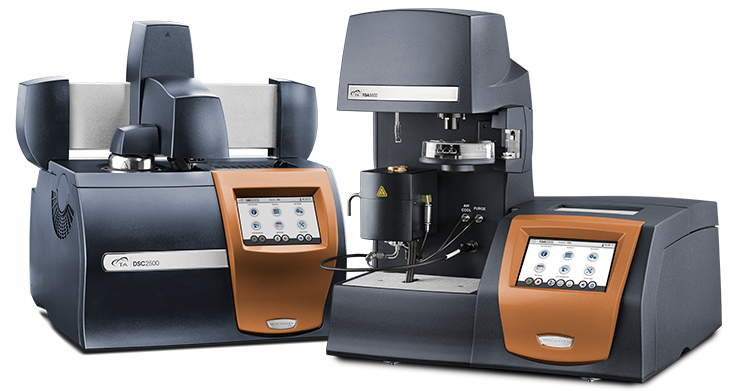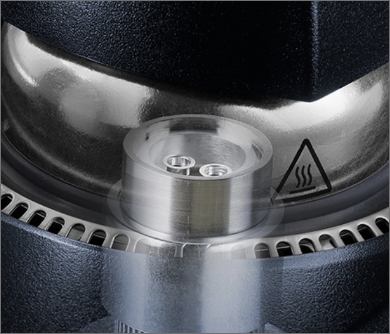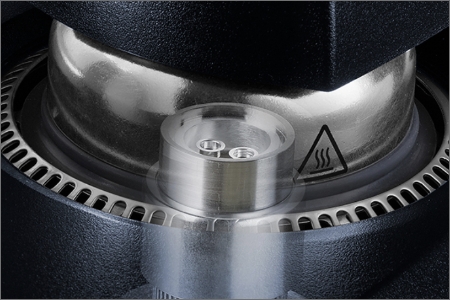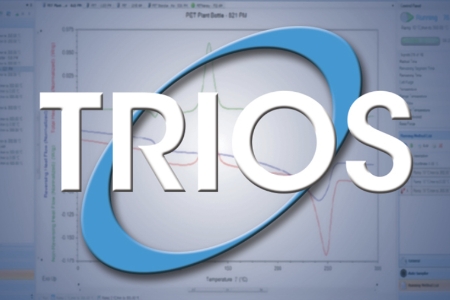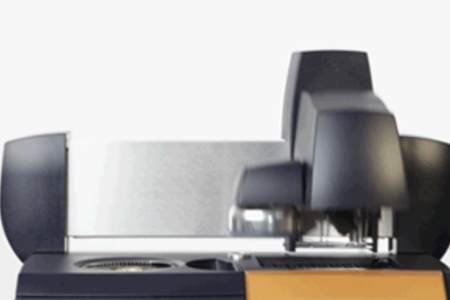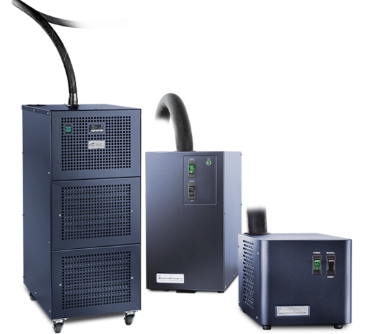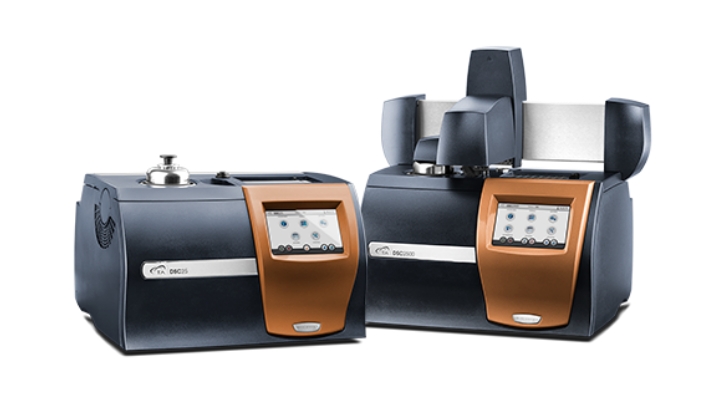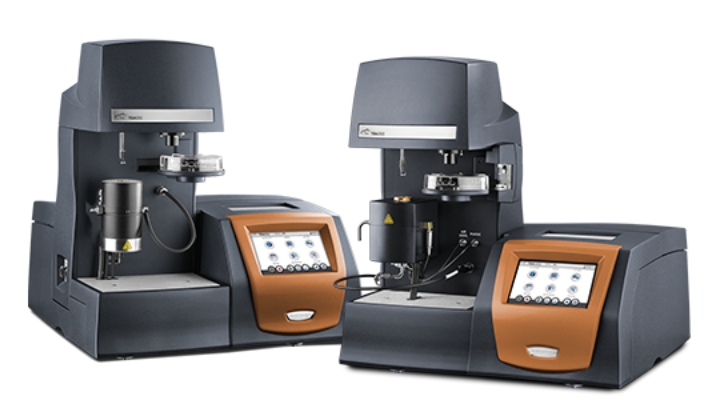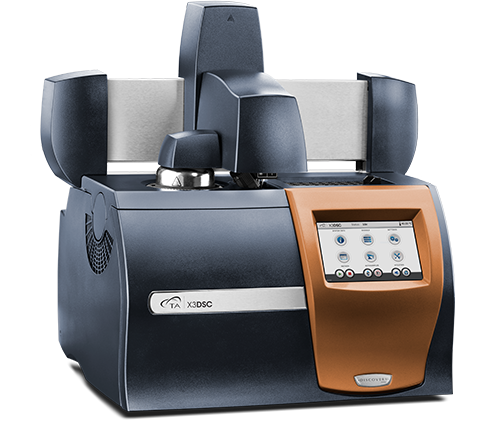COMPOSITE LAB PACKAGES
Accelerate the development of your composites by combining multiple techniques
Learn how the instrument packages below will optimize your processing conditions and characterize your product from precure through the final cured composite.
Learn how the instrument packages below will optimize your processing conditions and characterize your product from precure through the final cured composite.

Gain insight into curing times to optimize processing conditions, saving time and money
The DMA850’s furnace and DSC cell deliver rapid and accurate temperature control, allowing you to apply custom temperature programs to accurately mimic molding conditions and optimize cycle times.
Experience complete characterization across all stages - precure, through the cure, and final cured composite.
The DSC 250 and DMA 850 work together to bridge the gap between formulation changes and their impact on final composite product performance. The flat baseline of the DSC 250 and rugged DMA 850 frame deliver clear and accurate measurements allowing you to quantify formulation impacts on the cured composite’s cure strength, flexibility, adequate end use temperature ranges, and more.
Differential Scanning Calorimeters (DSC) measure temperatures and heat flows associated with thermal transitions in a material. Common usage includes investigation, selection, comparison and end-use performance evaluation of materials in research, quality control and production applications. Properties measured by TA Instruments’ DSC techniques include glass transitions, “cold” crystallization, phase changes, melting, crystallization, product stability, cure / cure kinetics, and oxidative stability.
Temperature Range: -180°C to 725°C
Detectable Information: Glass transitions, melting, crystallization, phase changes, heat capacity, cure kinetics, oxidative induction time
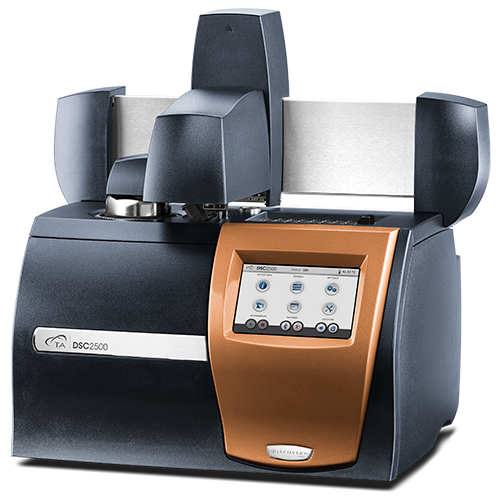
TA Instruments invites you to experience the world’s finest line of Differential Scanning Calorimeters, the Discovery DSC 2500, DSC 250 and DSC 25. Discover the advanced engineering and attention to detail that provides enhancements in every aspect of DSC technology and a new level of user experience. From the most cost-effective DSC with industry-leading performance, to the most advanced DSC available, there is a Discovery DSC to meet your needs and exceed your expectations.
Key Features:
- New Fusion Cell™ with patented technology for unrivaled performance in baseline flatness, sensitivity, resolution, reproducibility, and reliability.
- Exclusive T4P Tzero® heat flow technology for ultimate DSC performance and unique capability to conduct and store heat capacity measurements in a single run.
- New innovative “app-style” touch screen puts instrument functionality simply One-Touch-Away™, enhancing usability and making it easier than ever to get great data.
- Reliable linear autosampler with programmable tray positions for worry-free 24/7 operation, most flexible programming of experiments, and automated calibration and verification routines.
- Modulated DSC®, (MDSC®), for the most efficient separation of complex thermal events.
- Widest range of refrigerated cooling options eliminates liquid nitrogen expense and ensures uninterrupted subambient operation during extended autosampler routines.
- Tzero Press and Pans for fast, simple, and reproducible sample preparation.
- Commitment to quality backed by the industries ONLY five-year cell and furnace warranty for peace of mind.
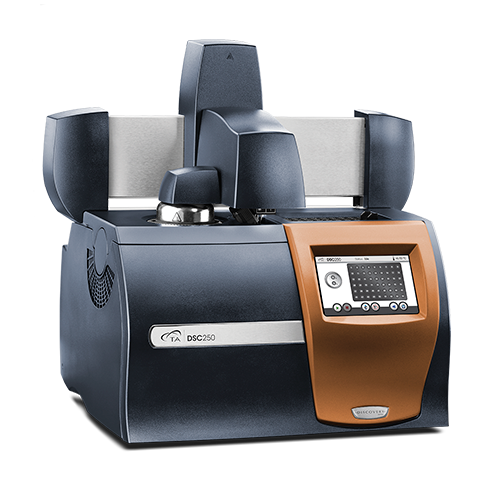
A rotational rheometer is used to measure viscosity (eta) and viscoelasticity (G’, G” and Tan delta) properties of a material. Rheometers can handle all kinds of samples from low viscosity liquids (e.g. water or solvents), semi-solid or soft gels, to high stiffness and high modulus solids. A rotational rheometer can perform flow measurements to test the viscosity of a liquid as a function of time, temperature shear rate or shear stress. Flow tests can also be used to measure the yield stress and thixotropic properties of a structured fluids. The rheometer can also perform dynamic oscillatory measurements to measure the viscoelastic properties of a semi-solid or solid sample. Typical oscillation tests are used to verify the linear viscoelastic region; monitor thermoset curing or sample stability; quantify differences in different formulations; measure polymer melts to compare differences in their molecular weight and molecular weight distribution; measure sample modulus and elasticity change as a function of time and temperature; measure glass transition (Tg) and sub-ambient transitions of polymers or polymer blends. In addition, a rotational rheometer can also perform transient type of measurements to study creep-recovery and stress relaxation.
Temperature Range: -150°C to 600°C
Detectable Information: viscosity, yield stress, thixotropy, curing, modulus (G’, G” G*), damping factor (tan delta), glass transitions, sub-ambient transitions, stress relaxation, creep-recovery
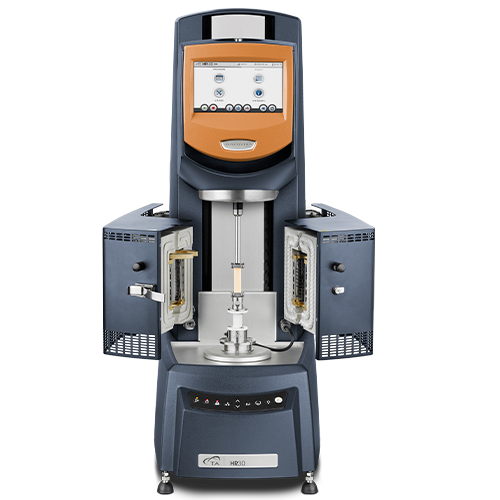
Dynamic Mechanical Analysis measures the mechanical properties of materials as a function of time, temperature, and frequency. In addition to basic material properties, DMA also quantifies finished part characteristics, reflecting the important contribution that processing has on end-use performance. DMA is commonly used to measure glass transition temperatures and secondary transitions, orientation caused by processing, cold crystallization and effect of crystallinity on mechanical properties, cure optimization, filler effects in composites, and much more. DMA provides an accurate measure of material strength (modulus) but also other important mechanical properties such as damping, creep, and stress relaxation.
Temperature Range: -150°C to 600°C
Detectable Information: Glass transition temperature (Tg), secondary transitions, modulus, viscoelasticity (storage modulus, loss modulus, tan delta), creep and creep compliance, stress relaxation, shrinkage and shrinkage forces
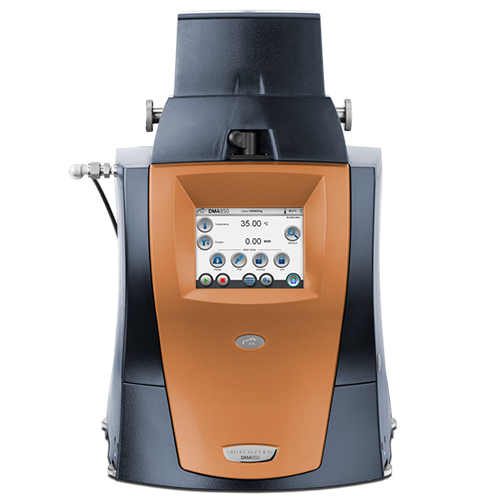
Thermogravimetric Analyzers measures temperatures and weight changes associated transitions in a material. Common usage includes decomposition, volatilization, residue, material composition analysis, decomposition kinetics, thermal and oxidative stabilities.
Temperature Range: 30°C to 1200°C
Detectable Information: weight change temperature, weight change amount, decomposition kinetics, residue.
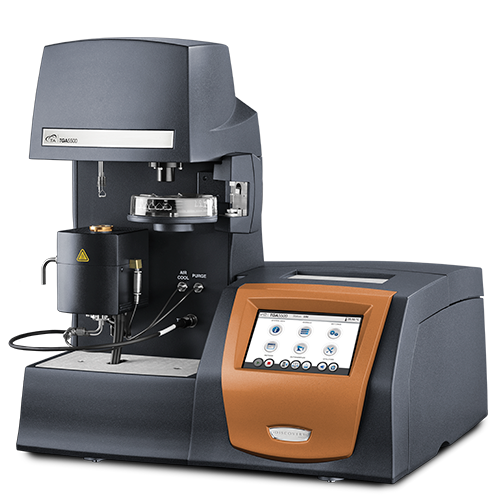
Gain insight into curing times to optimize processing conditions, saving valuable time and money.
Process optimization – oven temperature, molding times, and more. Determine the presence of residual cure and Tg position.
Industry leading reproducibility of results that provide an accurate measure of composite composition.
With TGA quantify filler content or monitor the presence of volatiles.
Technology
Combine the DSC 250 Auto and DMA 850 to experience complete characterization
How the DSC 250 Auto and DMA 850 together will benefit your lab:
Easily quantify the effects of formulation changes on cure reaction kinetics, working time, and product performance.
Changes to resin formulation through concentration changes and ingredient swapping has direct impact on the curing kinetics, working time, and performance of the cured composite. Quantifying the impact of the changes is easily accomplished with measurements on the DSC 250. Save time and money by utilizing this information to tailor the reaction kinetics and predict product performance, thereby streamlining product development.
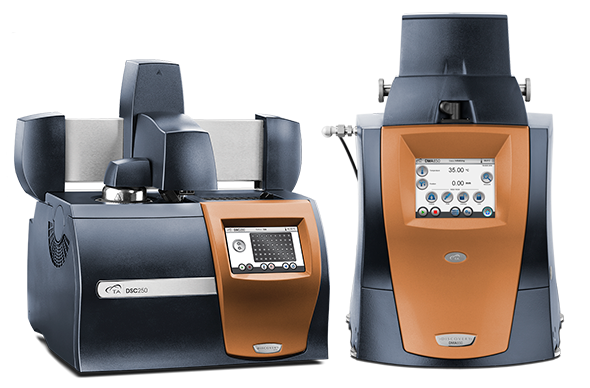
Combine the DSC 250 Auto and
HR 30 with ETC oven in your lab
How the DSC 250 Auto and HR 30 together will benefit your lab:
Easily quantify the effects of formulation changes on cure reaction kinetics and working time
The HR 30’s rugged frame, superior measurement sensitivity, and automatic strain adjustment deliver clear, accurate data from beginning to end of your cure experiment. Tracking the cure reaction in real-time with the HR 30’s low torque performance, allows you to clearly pinpoint the minimum viscosity and gel point with confidence. Complement your rheology measurements with cure reaction kinetics from the best performing DSC for complete resin characterization, giving you a boost at every step of the formulation process.
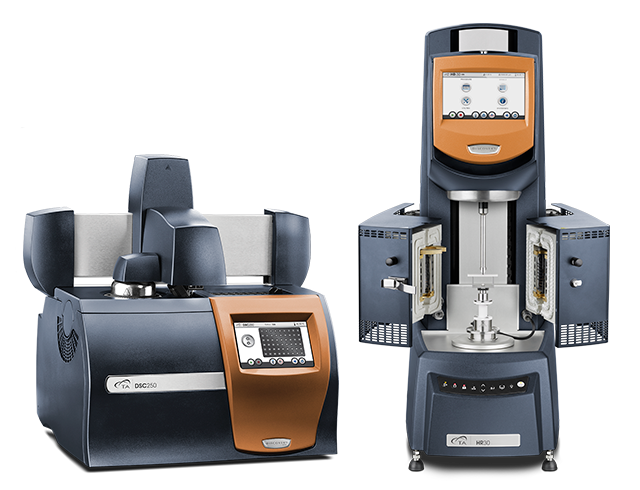
Combine the Discovery DSC and Discovery TGA and save time in your lab
How DSC and TGA together will benefit your lab:
Easily quantify the effects of formulation changes on cure reaction kinetics or curing temperature.
Capture cure temperature reaction kinetics from the DSC for complete resin characterization. Tailor reaction kinetics through changes in resin formulation.
